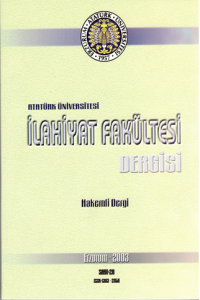TARİHSEL GELİŞİMLERİ İTİBARİYLE TEFSİR MUKADDİMELERİNE DAİR BİR İNCELEME / A Study on the Commentary Prefaces in Point of Their Historic Developments
Abstract
ÖZET
Bu çalışmanın amacı, tefsir mukaddimelerindeki ayrıntıları ortaya koymak, böylece bu sahadaki eserlerin yazılmasında etkili olan sosyal, siyasî, mezhebî ve psikolojik faktörleri aydınlığa kavuşturmaktır. Mukaddimeler, Kur’ân tarihi, Kur’ân ilimleri ve Kur’ân’ı öğrenmenin fazilet ve adabına dair bir çok konuyu içermektedir. Bu sebeple onlar tefsir usulündeki tarihî ve kronolojik
gelişimi takip etme konusunda bizlere önemli bilgiler vermektedirler. Tefsirlerin yazımında etkili olan diğer birçok dini ve kültürel etkene ilave olarak şunları da zikretmek mümkündür. Eski tefsirleri özetleme ihtiyacı, Kur’ân’ı tefsir etmenin, dünya ve ahirette kurtuluşa vesile olacak bir ibadet olarak kabul edilmesi, müfessirin mensup olduğu mezhebin görüşlerini propaganda etme gayesi, müfessirin yazdığı tefsiri hükümdara takdim etme arzusu. Sonuç itibariyle bu çalışmada
Kur’ân tasavvuru, tefsir-sosyal gelişme, tefsir-mezhebî eğilim, tefsir-siyaset ilişkisi konularında bazı sonuçlara varılmıştır.
Anahtar Kelimeler: Mukaddime, Kur’ân Tasavvuru, Sosyal Değişme, et-Taberî, ez-Zemahşerî, el-Kurtubî, el-Âlûsî.
ABSTRACT
This article aims to disclose details in the prefaces of commentaries, thus to enlighten the social, political, sectarian, psychological factors in the writing of them. Prefaces include a lot of
subjects as the history of Qur’an, the sciences of Qur’an, the merits and rules in the learning of Qur’an. So these prefaces give us important knowledges to follow historical and chronological progress in the commentary method. In addition to a lot of other religious and cultural factors that are effective on writing the interpretations we may mention these too: The necessity of summarization of old interpretations, the imagining to comment Qur’an as a worship that
causes the salvation in this world and hereafter, the goal of propagandizing the opinions of sect that exégete belongs to, desiring of exégete to present the commentary that he have written to ruler. Consequently, some results have been reached in this study as the progress of Qur’anic imagination in the Islamic history, correlations of the commentary-social development, commentary-sectarianism, commentary-policy.
Key Words: Preface, the Imagination of Qur’an, Social Progress, al-Tabarî, al-Zamakhsharî, al-Qurtubî, al-Âlûsî.Keywords
Details
| Primary Language | tr; en |
|---|---|
| Journal Section | Makaleler |
| Authors | |
| Publication Date | December 30, 2003 |
| Published in Issue | Year 2003 Issue: 20 |


